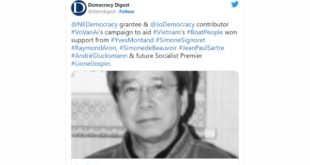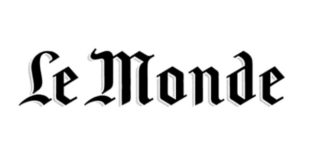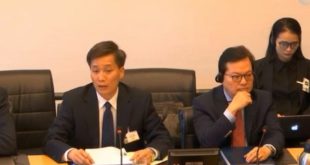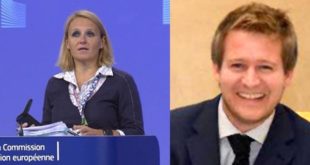HANOI, Oct 14 (Reuters) – After a brief reconciliation, Vietnam is back on the warpath against an outlawed Buddhist group whose leaders appear to be seeking to revive the organisation in defiance of the ban, diplomats said on Tuesday.
The crackdown on the Unified Buddhist Church of Vietnam (UBCV) by the communist authorities followed a meeting of the group on October 1, at which it vowed to revive its legal status, the diplomats added.
After a series of run-ins with the government starting in the late 1970s, the UBCV was replaced by an officially sanctioned Buddhist group in 1981.
Earlier this year, the government signalled warmer ties with the organisation.
But just a week after the October 1 meeting, authorities halted group patriarch Thich Huyen Quang and his deputy Thich Quang Do as they left their monastery for Ho Chi Minh City and questioned them for several hours about their activities.
On Friday, the Foreign Ministry accused the men of “carrying evidence of wrongful acts, including many documents classified as state secrets.”
On Saturday, the ministry issued a statement saying the men had “intentionally violated the laws, plotting in secret to re-establish the so-called Unified Buddhist Church of Vietnam to sabotage the Vietnam Buddhist Church,” and it added : “They also asked for and received help from outside to carry out this plot.”
If linked with espionage, the charges could carry a death sentence.
Hanoi will not say if the men are under travel restrictions. Quang is at his monastery in central Binh Dinh province. Do is at another monastery in Ho Chi Minh City, some 650 km (400 miles) south of the province.
Vietnam recognises six religions including Buddhism but insists on vetting their leadership and activities, which UBCV opposes. The group has continued to operate, but its leaders have been slapped with jail, travel restrictions and house arrest.
“The regime doesn’t like pluralism,” said Carl Thayer, a veteran Vietnam analyst with the Australian Defence College in Canberra. “To have anything independent flies in the face of their organisational history.”
Foreign analysts say it is unclear how the newest flare-up will be resolved.
What is certain is that it has put Vietnam once again on the defensive on human rights. European diplomats in Hanoi have officially registered their concern about the case.
“If they (Quang and Do) are re-arrested, it would be a self-defeating move for Vietnam, which insists there’s freedom of religion,” one analyst said.
The timing of the flare-up is also interesting.
U.S. Ambassador at Large for international religious freedom John Hanford is scheduled to visit Vietnam at the weekend.
The United States is one of Vietnam’s fiercest critics on religious rights, and some U.S. lawmakers want to limit aid to the country.
 Quê Me Quê Me: Action for democracy in Vietnam & Vietnam Committee on Human Rights
Quê Me Quê Me: Action for democracy in Vietnam & Vietnam Committee on Human Rights




